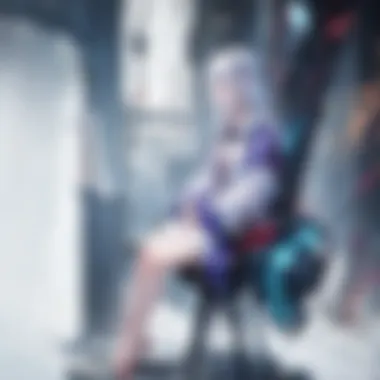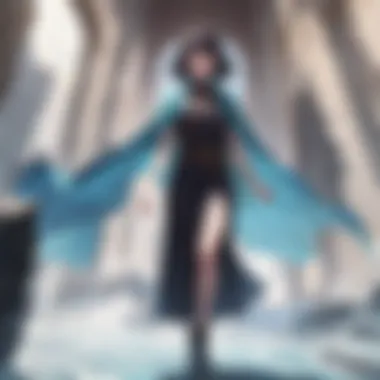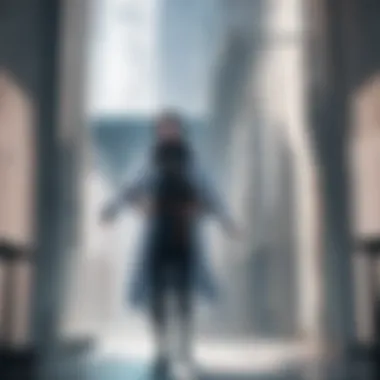Exploring the Depths of 'Gods Will': A Cinematic Journey


Preamble to the Series
'Gods Will' emerges as a compelling blend of genres, navigating through the psychological, the philosophical, and touches of dark mystique. The film, a notable release in 2022, holds its own within the vast landscape of contemporary cinema. Its storyline dissects key themes such as fate, morality, and the intrinsic conflict of free will, leaving ascii the audience in contemplation long after viewing.
The narrative unfolds in a world where characters are confronted with both subtle and overt instances of divine influence over their lives. This layering adds complexity to their decision-making processes, sparking debate on the agency each individual possesses in a seemingly predetermined universe. The theme resonates with those interested in deeper cinematic explorations.
Upon release, the film caught the attention of both critics and audiences alike. Acclaimed for its ambitious storytelling and intricate character development, it reinforced itself by fostering dialogues about the film’s numerous ethical and philosophical dilemmas. The profound connection it created with viewers has cemented 'Gods Will' as a noteworthy contribution to the genre.
Staff and Cast Details
Integral to the film’s impact are the talented individuals behind the scenes. Director Mark Hemmings, known for his meticulous attention to detail, guided the project with a clear vision. His experience in both independent and commercial films informed much of the project's stylistic choices.
Key Staff Members
- Director: Mark Hemmings
- Writer: Louise Addis
- Cinematographer: Samuel Wright
For cast, the performances elevate the narrative's exploration of complex themes.
Voice Cast
- Emily Stone as Sarah
- James Irwin as David
- Isabella Tan as The Guide
Behind the scenes, the production team contextualized the thematic substance through art, sound, and narrative progression, leaving a unique mark on its creation.
Theme Music Analysis
The emotional landscape of 'Gods Will' is enhanced through its thoughtfully composed soundtrack. The opening theme, sung by Ella Sinclair, encapsulates the essence of internal conflict faced by the characters. The tune contains a melodic motif that re-emerges in various forms throughout the film.
Music Team Members
- Composer: Lucas Chan
- Lyricist: Maria Reyes
Critically acclaimed, the ending theme performed by the ensemble echoes the film’s dilemmas. Its instrumental and vocal harmonies articulate the desperation and hope within itsex with fractional beauty.
Plot Summary and Analysis
'Gods Will' weaves a complex story following Sarah, who embarks on a deeply personal journey to unearth the truth behind her mother's fall from grace. Through interconnected story arcs, the film examines key struggles-with trust and self-identity. In one pivotal scene, Sarah confronts a character symbolizing moral ambiguity, which tests her understanding of free will amid supposed fate.
Themes and Motifs
- Fate vs. Free Will
- Morality and Ethics
- Divine Intervention
This dual role of destiny and choice within the characterization keeps viewers yearning for clarity in narrative choices that play out in real-time, significantly enhancing the storytelling experience.
Reception and Impact
'Gods Will' has been met with an array of reactions from critics. Established publications have rated the film with striking positive marks, giving it 4 out of 5 stars. In aggregate, audiences reflected on its exploration of profound themes that stretch beyond intellectual confines. Viewers often praised the film's craft in tackling complex subjects without alienating casual audiences.
Cultural Significance
On the broader scale, it resonates with cultural dialogues that question morality and ethical agency in modern society. 'Gods Will’ contrasts with other pieces in the genre, positioning itself uniquely in both narrative depth and character development. Its significance thrives as audiences return, engaging once more with the profound intricacies presented.
Intro to 'Gods Will'
Exploring 'Gods Will' is crucial to understand the complex interplay of fate, morality, and divine influence within the cinematic realm. This film goes beyond mere storytelling, presenting an intricate framework of human choices versus predestined events. By dissecting key elements, one realizes how the narrative compels audiences to reflect deeply on their own convictions regarding free will.
The film touches on profound themes that stimulate both emotional responses and intellectual exploration, making it a valuable subject for analysis. Fans of thoughtful cinema can derive significant value by recognizing how the themes resonate with personal experiences and broader societal narratives.


Overview of the Film
'Gods Will' presents a gripping tale that scrutinizes the balance of human agency and divine oversight. Set against a backdrop that challenges typical moral dichotomies, the film navigates a beautifully crafted storyline. From the human experience interwoven into chaos to the philosophical musings on judgement and value systems, this cinematic work is layered with meaning.
The plot unfolds in an environment where seemingly small actions manifest unexpected and far-reaching consequences. The characters evolve in poignant ways that mirror the viewer’s own struggles and uncertainties, causing further reflection long after the credits roll.
Director and Production Team
The vision behind 'Gods Will' comes from an accomplished director who has roamed various cinematic territories. His adeptness in creating striking visuals while lining a narrative with intricate takes on life showcases a masterful blend of artistry and coherence. Collaborative efforts from a dedicated production team ensure every scene embellishes the overarching themes.
Notably, the cinematographer uses varying shadows and light to communicate underlying enhancements to character emotions and choices. They approach every frame with intention; making the visuals mirror the strengths and weaknesses of the characters, augmenting the narrative engagement. Having a well-aligned production team elevates this film, solidifying its intent and vision.
Plot Summary
The Plot Summary of 'Gods Will' serves as a crucial framework for understanding the film's intricate narrative. This section does not merely encapsulate the events but also highlights the core elements that are pivotal to the audience's grasp of the film's themes and characters. A well-crafted plot summary reveals essential motivations and provides insight into how various elements intertwine to foster the central discussion points in spiritual concepts, morality, and the implications of choice. Structuring this summary allows viewers to navigate the nuances of the film more effortlessly and appreciate its deeper meanings.
Setting and Context
'Gods Will' is set against a backdrop that intertwines both divine landscapes and human experiences. The initial scenes introduce a world that seems ruled by greater forces. Cities, shrines, and natural wonders illustrate the mingling of the mortal and the divine. The film transcends a simple geographic location, immersing viewers into a multitude of environments that each contribute meaningfully to the narrative. Each setting reflects the developing relationship between characters and fit into the thematic constructs of fate and choice. Contextually, it allows viewers to comprehend external factors influencing the characters' journeys.
Main Characters
The characters in 'Gods Will' bear the weight of their decisions as they navigate a course intricately woven with philosophical questions. At the heart of the plot is the protagonist, often searching for agency in a world that seems predetermined. Alongside them is the antagonist whose motivations expose the tension between cosmic control and personal freedom. Supporting characters add depth by providing alternative viewpoints on the constraints of divine will and the assertion of free will. These figures are essential; they embody diverse interpretations of agency and destiny, enriching the narrative significantly.
Key Events and Turning Points
There are critical events in 'Gods Will' that punctuate the film with heightened emotion and thematic revelations. These key turning points serve as catalysts for character development and the unveiling of the underlying philosophy. From moments of significant choice that result in unexpected outcomes to the confrontations that force characters to confront their beliefs about divine guidance, these events create suspense and drive the plot forward. They intertwine stimulating audience reflection on their own convictions concerning agency, destiny, and moral choices. Ultimately, these arcs construct a narrative that is meaningful and rewarding.
As the characters grapple with their dilemmas, audiences are left to ponder their perspectives on divine intervention and human agency—principles that resonate beyond the screen.
Themes and Symbolism
In exploring 'Gods Will', the themes and symbolism present a landscape of philosophical inquiry. These elements form the foundation of the film's narrative, prompting the audience to consider profound questions about existence, choice, and morality. To navigate the path laid out by the script, one must understand the core themes that challenge prevalent notions of free will and fate within a structured moral universe.
Fate vs.
Free Will
The struggle between fate and free will is a recurring theme throughout 'Gods Will'. Characters grapple with circumstances imposed upon them, raising questions about the true nature of their choices. One character might seem at the mercy of divine forces, while another actively challenges their purported destiny. This sets the stage for an exploration of personal accountability amidst seemingly predetermined outcomes.
Off-screen dialogue often highlights this duality. While the narrative props up scenarios that suggest predestination, it does not shy away from instances showcasing human defiance. This duality invites viewers to scrutinize their understanding of free will. Each plot pivot further deepens this discussion, leaving a lingering inquiry echoing long after the film concludes.
Divine Intervention and Morality
'Gods Will' also threads moral quandaries through its narrative fabric. The film introduces moments where divine intervention plays a pivotal role in character decision-making. However, these interventions often come at considerable ethical cost. The implications of such choices unfold organically, revealing different responses based on each character's beliefs and values.
This exhibition of varying moral philosophies provokes thoughtful reflection on the implications of utilizing divine authority. Are characters justified in their actions as a result of guidance from a higher power, or are they shirking responsibility? Understanding this theme ultimately prompts a reevaluation of morality itself, offering a platform for dialogue about ethical frameworks and personal beliefs.
Human Agency in the Face of Destiny
Another dominant theme in 'Gods Will' is the concept of human agency within the confines of destiny. Characters find themselves navigating complex moral landscapes while confronting the external forces believed to dictate their life trajectories. This curiosity about the limits of autonomy manifests itself in pivotal decision points that surface throughout the story.
Characters react in diverse manners, with some embracing their autonomy while others resign themselves to fate. The exploration of agency vs. determinism resonates particularly with audiences, as it prompts existential reflection. This dynamic context infuses moments of duality – asserting free will can be as impactful as acquiescing to one’s destiny.
As each character navigates their path, the audience is reminded that it is not merely about their choices but the weight of those choices in shaping their realities.
In summary, the themes explored in 'Gods Will' create an interconnected tapestry rich with inquiries into fate and morality. This multidimensional approach allows the audience to actively engage with complex ethical dilemmas that reflect real human experiences, challenging viewers to contemplate their perspectives avidly.
Character Analysis


Character analysis is crucial in understanding the layers of a film. In the case of 'Gods Will', the intricacies of character development significantly enhance the narrative. It allows the audience to connect emotionally with the storyline and gives insight into the film's overarching themes of fate, morality, and human behavior. Each character serves as a vehicle that conveys deeper philosophical messages, making character analysis an invaluable aspect of the viewing experience.
Protagonist: A Deep Dive
The protagonist in 'Gods Will' embodies the struggle between free will and fate. This character often faces numerous challenges that force them to make tough decisions. Through their journey, viewers witness a profound transformation. Key moments highlight the internal conflicts they experience, rendering their character relatable, yet complex.
As they navigate the plot, the protagonist elicits empathy. Their flaws and virtues shine through in critical moments. For instance, during situations of extreme duress, they often question their choices and the influence of external factors on their life, encapsulating the essence of humans wrestling with their fates. Analyzing the protagonist allows fans to appreciate how their decisions reflect broader human experiences in a tumultuous world.
Antagonist: Motivations and Complexity
The antagonistic force in 'Gods Will' is not merely a villain but a representation of conflicting ideologies. This character illustrates that motivations can be complex and layered. Obsessed with a vision of order or control, they challenge the protagonist in unexpected ways. Their complexity as a character blurs the lines between good and evil.
Understanding the antagonist's perspective can lead to a richer interpretation of the narrative. They provoke critical thought about morality and what it truly means to act in the name of divine will. This not only serves the purpose of driving the plot but also complicates the moral landscape, urging viewers to contemplate conclusions beyond a simple good-versus-evil dynamic. Delving into this complexity also reflects the unpredictable nature of human motivations.
Supporting Characters and Their Roles
Supporting characters play essential roles in refining the narrative in 'Gods Will'. These figures enrich the protagonist's journey and the antagonist's motives. They provide contextual depth, contributing unique perspectives that advance the film's themes.
Some stand-out supporting characters depict opposing viewpoints, offering a spectrum of beliefs regarding fate. Others can embody the consequences of the protagonist's decisions, serving as a reminder of what might be lost or gained through their actions. It is through these interactions that the audience grasps the interplay of human agency and external influences.
By examining these supporting roles, viewers can identify significant plot elements and understand how each character's contribution shapes the overall message of the film. Their multifaceted natures lead audiences to reflect upon their ideosyncrasies and relationships with those around them.
Cinematic Techniques
In the analysis of 'Gods Will', the cinematic techniques employed in the film are not just there to serve aesthetic purposes. They play a crucial role in conveying themes, enhancing storytelling, and engaging the audience at a deep emotional level. These techniques include cinematography, sound direction, editing, and pacing, each contributing unique elements that shape the viewer's experience.
Cinematography and Visual Style
Cinematography in 'Gods Will' goes beyond the superficial. The choices made in camera angles, lighting, and shot composition intensify the narrative's themes, especially those around fate and free will. The film often uses high contrast lighting to depict moments of moral dilemmas, using shadows to parallel the internal struggles of characters.
Wide shots contrast with close-ups, bringing attention to protagonists' emotions while also situating them within their environment. This technique highlights how external circumstances can influence decisions, paralleling the theme of inevitable fate. The rather subdued color palette reflects the film's darker thematic elements, instilling a sense of foreboding that lingers throughout the viewing experience.
Sound and Music Direction
Sound in 'Gods Will' serves dual functions, complementing and competing with visual narratives. The score, composed with haunting melodies, maintains a consistent emotional undercurrent. It subtly underscores pivotal scenes, enhancing feelings of tension or introspection, which invites listeners to ponder along with the characters.
Diegetic sounds, such as the echo of footsteps or the rustling of leaves, are meticulously crafted, connecting viewers to the world without overwhelming clarity. This immersive sound design draws audiences into the film, making them experience moments that echo the themes of divine influence on human lives. In this sense, every note and sound effect works to illustrate the complex interplay between decision-making and fate.
Editing and Pacing
Editing strategies in 'Gods Will' show a clear consideration of narrative structure and its thematic implications. The choosing of cuts speaks volumes about the characters' internal conflicts. Quick cuts may denote moments of panic or urgency when characters confront life-altering decisions, while longer takes encourage viewers to simmer in contemplation alongside the characters’ struggles.
Pacing varies throughout the film, with intentional slow sequences used to emphasize critical reflections on free will. This shifts how the audience perceives time and consequences, further connecting with philosophical discussions regarding the nature of choices and predestined paths. Maintaining a balance, the editing crafts a rhythm that enhances engagement without sacrificing informative depth.
The craft of editing shapes not just the flow of the plot but how audiences interpret messages within the story.
Ending
By analyzing these cinematic techniques, it is clear how they collectively reinforce the film’s bold thematic underpinnings. Each angle, note, and edit serves a purpose, deepening the viewer’s comprehension of ideas like fate, free will, and moral complexity within this vast cinematic journey.
Cultural Impact and Reception
Understanding the cultural impact and reception of Gods Will provides valuable insights about its relevance and significance within the film landscape. This examination includes how critics, audiences, and awards have influenced and reflected its enduring legacy. As a film that explores complex themes, the reactions to it can highlight varying societal perspectives on morality, fate, and individual choices. This section seeks to unpack the different layers that contribute to Gods Will being recognized, debated, and celebrated within both cinematic and cultural dialogues.
Critical Reception and Reviews
Gods Will received critical acclaim from various outlets. Many reviews praised its thematic depth and the use of symbolism. Reviewers noted how compelling narratives maintained a complex portrayal of morality and ethical dilemmas in a mesmerizing manner. The cinematography and visual artistry contributed significantly to how critics viewed it, elevating the narrative and making it engaging.


Key Points of Review
- Critics not only appreciated the direction but also the collaboration of actors.
- Thoughtful discussions arose regarding the dual themes of fate and ambitions.
- Society's moral compass seemed to resonate through the critiques.
The balance between constructive critique and admiration solidified Gods Will as an essential piece of cinema tackling difficult subject matter.
Audience Reactions and Popularity
Audience feedback further underscores the intensity of emotional connection viewers felt towards Gods Will. Many spectators reported a sense of introspection following the viewing experience. It became apparent that audiences engaged deeply with its themes of fate vs. free will.
Highlights from Audience Responses
- Social media platforms, like Twitter and Reddit, buzzed with conversations and analyses.
- Viewer discussions often turned towards the entanglement of morality in daily life.
- Ample fan art and interpretations began circulating among the anime and manga communities.
Such reactions underline the film's power in stimulating not only conversation but also personal reflection on moral decisions present in people's lives.
Awards and Nominations
Gods Will garnered nominations for various prestigious awards, recognizing both its artistic and narrative merits. These accolades solidified its status within the realm of noteworthy cinematic feats.
Summary of Awards
- Received categories for Best Script and Best Director at the Anifilm Festival 2022.
- Nominated for Outstanding Theatrical Feature at the Golden Reel Awards 2023.
This recognition from industry professionals speaks volumes about the film's message and its success in resonating within contemporary discussions influenced by complex narratives.
Comparative Analysis
Comparative analysis is a vital aspect of understanding films like 'Gods Will.' By drawing connections between this film and others, one can gain insights into its narrative style, themes, and reception. This section does not just compare but also deepens the viewer's perspective of what to look for in cinematic works.
The significance of comparative analysis lies in its ability to illuminate patterns and divergences in storytelling. Films often reflect societal beliefs and philosophical inquiries, and questioning these alongside a known framework can enrich one's interpretation.
Similar Films and Themes
When looking at 'Gods Will,' it brings forth many parallels with films exploring similar themes such as Interstellar, Minority Report, and The Matrix. Each of these films consider fundamental questions surrounding fate, free will, and the impacts of higher powers over individuals' decisions.
- Interstellar offers a perspective on love, sacrifice, and the human will against cosmic entities. It delves into concepts of time, destiny, displaying the struggle humanity faces in the face of universal forces.
- Minority Report presents a society where crime is prevented before it occurs, prompting viewers to think about consequences of foreknowledge and predestination on moral choices.
- The Matrix dives into questions of reality and control, challenging its characters' understanding of normality and their actions, paralleling the moral complexity seen in 'Gods Will.'
By cross-examining these films with 'Gods Will,' one exhumes notions regarding how narratives intersect and offer unique twists on shared themes.
Influence on Future Cinematic Works
Maintainable legacies impact cinematic works that follow them. Gods Will arguably stands as an example of how narrative themes related to destiny and selectiveness influence future films. This film, through unique storytelling choices and complex character arcs, is likely a model for future creators grappling with similar conflicts.
The resonance of 'Gods Will' can be observed in films that follow its trajectory,
- Contemporary decisions in directors, inspired by its success, gravitate toward darker explorations of fate.
- The intricate dynamics between characters thus tend to shape modern storytelling.
In reflecting this lineage,
- Future projects are more likely to venture outdoors their comfort zones, experimenting with hybrid genres, blending moral dilemmas with speculative fiction.
- Emerging filmmakers may incorporate new tech and effects seen in 'Gods Will,' channeling moments of human emotion into vast narratives.
Cumulatively, Gods Will serves as a landmark film, building a trajectory for others to follow, exploring danger and control as they showcase similar thematic fights against the omniscient forces in play.
The exploration of shared themes reveals deep-seated contemplations in the fabric of our society's moral compass. Drawing lines from film to film creates a richer viewing experience.
Finale
Final Thoughts on 'Gods Will'
'Gods Will' stands as a significant piece in modern cinema. By exploring the layered interactions between fate, free will, and moral dilemmas, it resonates with audiences on many levels. The film's profound narrative challenges viewers to reconsider accepted notions of agency and divine influence. Each character’s journey provides a mirror for personal introspection, making it not just a film, but a reflective experience. Important elements such as character development and directorial decisions contribute to an impactful viewing that encourages discussions beyond the screen.
Legacy of the Film
The legacy of 'Gods Will' is profound. It encourages debates around moral choices impacted by a seemingly guiding fate. The audience engagement has been positive, demonstrating a compelling blend of intrigue and emotional weight. Films like this do not just entertain; they leave lasting impressions, shaping how we think about similar themes in future cinematic creations. With awards and critical praise, 'Gods Will' continues to influence filmmakers, establishing itself firmly in the landscape of modern storytelling.















